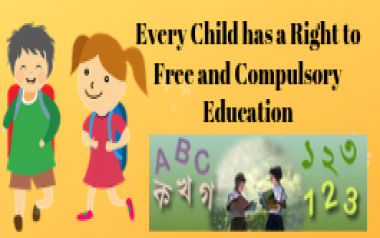All You Need To Know About Right To Education Act, 2009. The intention of our Constitution framers was to educate every child of the nation. So they expressly mentioned under article 45 of the Constitution free and compulsory education for children. as a duty of the state, but even after 52 years of independence, there was no effective initiation by the government.
Later, The Constitution 86th amendment act,2002 inserted Article 21-A in the constitution of India. It provides free and compulsory education of all children in the age group of 6 to 14 years as the FUNDAMENTAL RIGHT
Right education, 2009 describes the modal qualities of free and compulsory education for children aged 6-14 years in India under Article 21 (A) of the Constitution.
PURPOSE:
- This act provides ‘free and compulsory’ education for children between 6-14 years.
- term ‘ free education’ here means no child required to pay any kind fees or other expenses(tuition, uniform, books, study materials)
- This act implies education free from anxiety, stress, and fear.
- The act provides easy access for children to elementary schools in the neighbourhood.
- 25 percent of the seats in private schools are reserved for RTE students who are funded by the government. The Centre and the State share the joint responsibility to provide funds for RTE execution.
- The school to ensure all-round development of the child and practice inclusion without denying admission to any child on any grounds.
- There should be one specialized teacher each for teaching (i) Science & Mathematics (ii) Social Sciences and (iii) Languages.
- A full-time Head Teacher is recommended for a school with more than 100 students.
- Classes I to V should have 200 working days & Classes VI to VIII 220 working days per academic year, with a 45-hour workweek.
- All-weather classroom for every teacher in the school, an office, a storeroom, and a principal’s room.
- The school has to ensure hygienic kitchen for midday meals, safe drinking water facility, and separate toilets for boys and girls along with proper fencing, playground and a library with relevant books and teaching aid.
THE ACT PROHIBITS:
- Physical punishment and mental harassment.
- Screening procedure for admission of children.
- Capitation fees.
- Private tuition by teachers.
- Running of school without recognition.
The National Commission for Protection of Child Rights (NCPCR) has been mandated to monitor the implementation of the Right to education. A special Division within NCPCR will undertake this huge and important task in the coming months and years. A special toll-free helpline to register complaints will be set up by NCPCR for this purpose. NCPCR welcomes the formal notification of this Act and looks forward to playing an active role in ensuring its successful implementation.
The Right to Education Act has laid down a comprehensive standard to be maintained by schools and authorities for creating a conducive environment for learning.

